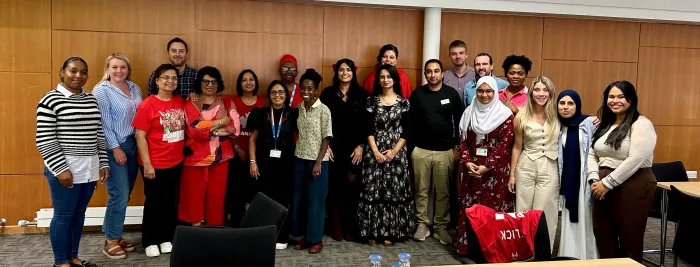
As the lead ARC for Equality, Diversity and Inclusion of under-represented groups in research, the East Midlands team has developed a toolkit to help other ARCs implement the new NIHR requirement, which will make inclusive research design a mandatory condition for all funding awards starting in Autumn 2024.
The Centre for Ethnic Health Research, as part of NIHR ARC East Midlands, created the Equality Impact Assessment (EqIA) Toolkit – which aims to ensure that individuals who face disadvantage and underrepresentation are visible in priority research settings – as well as delivering vital training to upskill the research workforce. This work by ARC East Midlands has led to the ‘Equality in Research Matters’ campaign.
It helps researchers proactively take steps to advance equality of opportunities, eliminate discrimination and engage people with protected characteristics in the development, implementation and dissemination of health research.
ARC East Midlands has been leading in this area to instigate this unique method for conducting health research, having introduced the process in 2019.
To support ARC teams carrying out the assessment, the East Midlands team is also hosting ongoing webinars dedicated to the topic.
Professor Kamlesh Khunti, Director of NIHR ARC East Midlands and Professor of Primary Care Diabetes and Vascular Medicine at the University of Leicester, said: “We are proud to be at the forefront of advancing equality studies, especially as the NIHR’s new mandate on inclusion will soon take effect.
“It represents a significant step forward in creating research that truly reflects and serves our diverse communities, setting a new standard for excellence and equity in the field.”
Professor Khunti is also the director of the Centre for Ethnic Health Research – an organisation hosted by NIHR ARC East Midlands that address inequalities that are associated with ethnicity in health care access and health outcomes.
According to the NIHR, good research must include people from the diverse populations of the UK and include more women, children and older people. Research inclusion is an important key to improve health and care for everyone and reduce health and care inequalities.
With the launch of its toolkit and workshops, ARC East Midlands is proactively taking steps to advance equality of opportunities, eliminate discrimination and engage people with protected characteristics in the development, implementation and dissemination of health research.
To access the toolkit, click here. To attend a workshop, register here.
